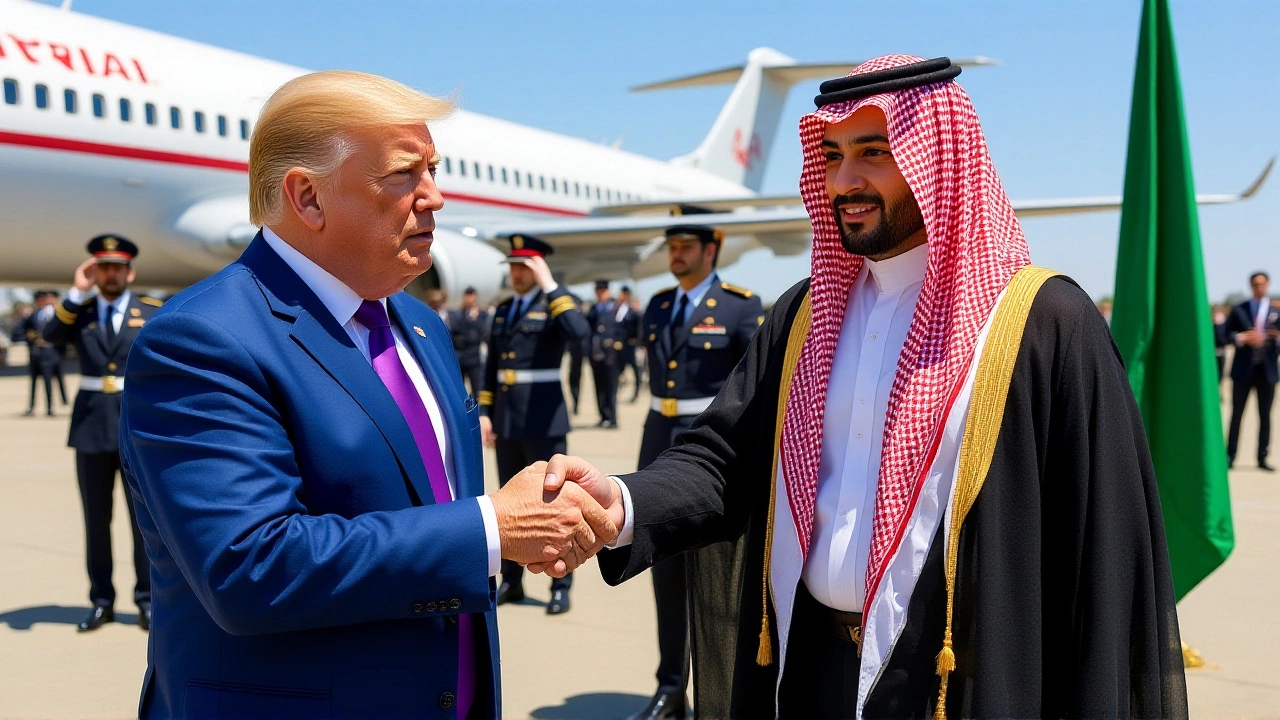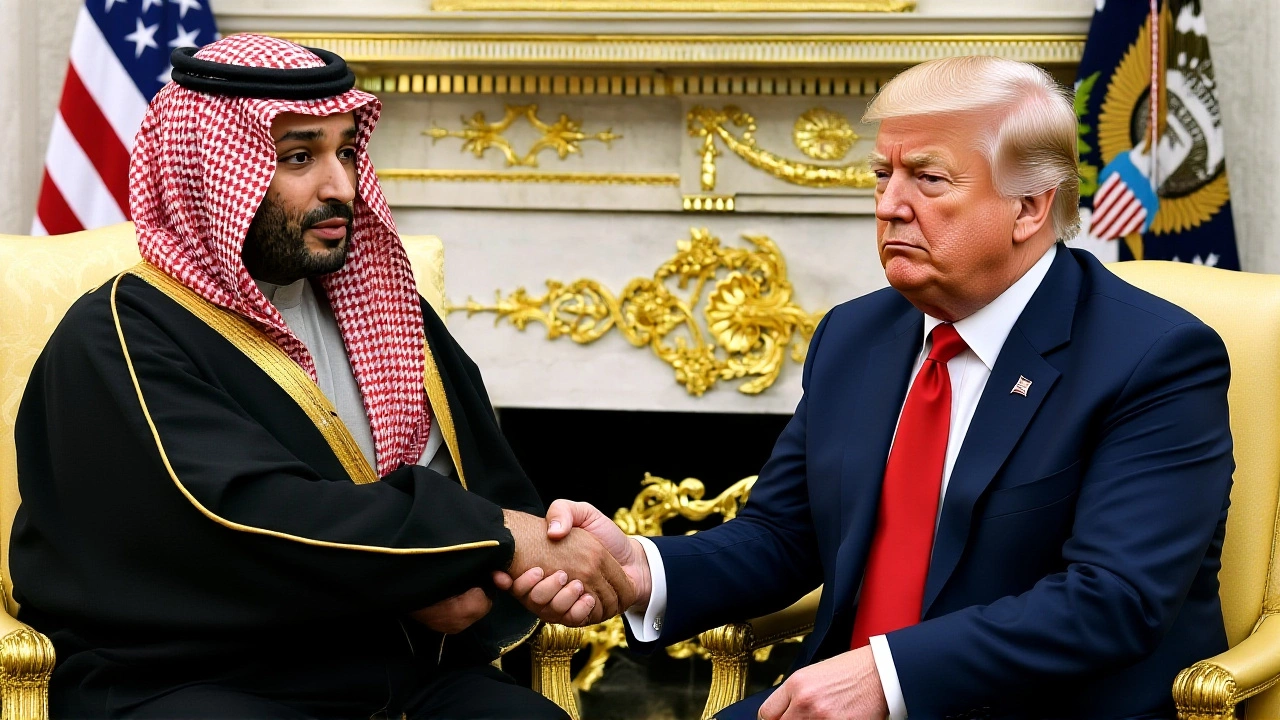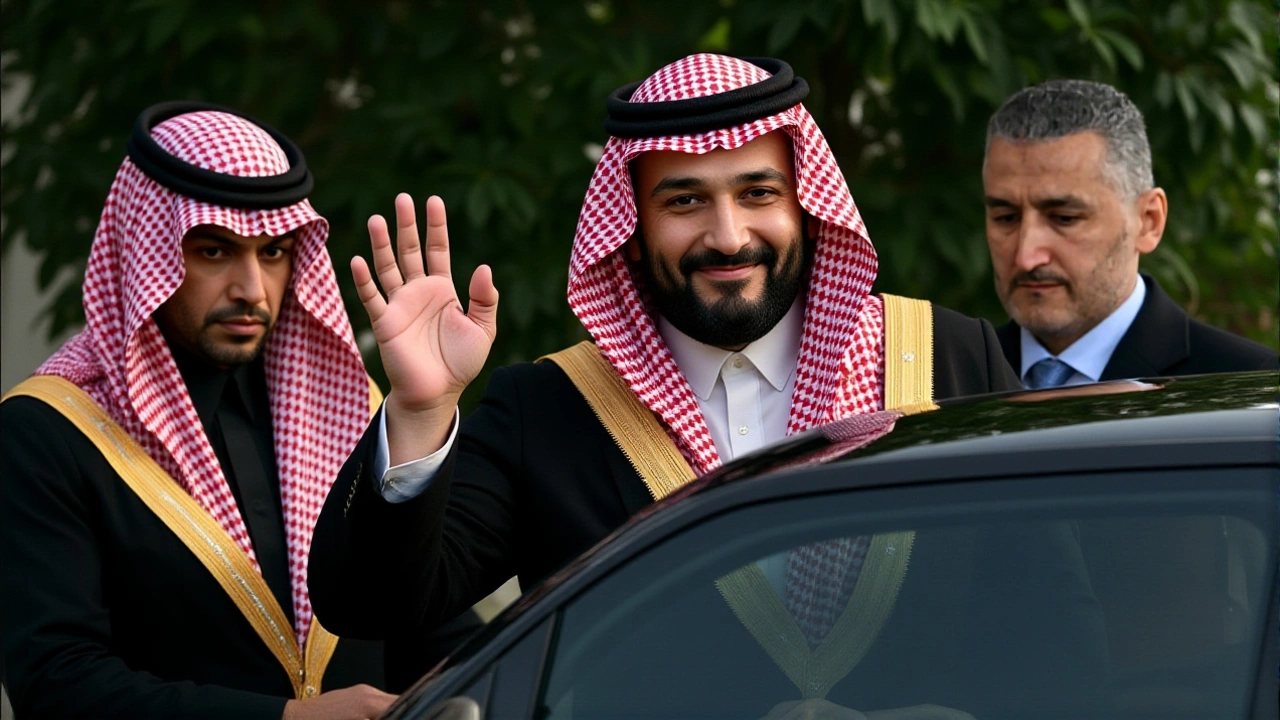When Mohammed bin Salman walked into the U.S. Capitol on Wednesday, November 19, 2025, he wasn’t just visiting — he was being welcomed as a partner. No longer the pariah of 2019, the Crown Prince of Saudi Arabia sat across from lawmakers who, just seven years ago, called for sanctions against him over the killing of Jamal Khashoggi. Now? They shook his hand. Signed deals. Even smiled. The shift isn’t subtle. It’s seismic.
A New Chapter in Riyadh-Washington Ties
The day before, on November 18, 2025, Mohammed bin Salman had already made headlines at the White House, where President Donald Trump hosted a lavish state dinner and declared, "We’ve always been on the same side of every issue." That line — repeated in Atlantic Council reports — wasn’t just diplomacy. It was a signal. Trump didn’t just welcome him. He embraced him. And then, they signed five binding agreements: a defense pact allowing the sale of F-35 fighter jets, an AI cooperation framework, nuclear energy talks finalized, a critical minerals supply chain pact, and a streamlined investment deal for Saudi capital in U.S. markets.What Congress Saw — and Didn’t Say
The Capitol meeting on November 19 wasn’t televised. No press pool. No official list of attendees. But sources confirm leaders from both the Senate and House were present. And the tone? Warm. Collaborative. No one raised Khashoggi. No one demanded human rights conditions. Not even a whisper. Instead, discussions centered on shared security threats — Iran’s missile program, Houthi strikes on shipping lanes, and the lingering instability in Yemen. The Saudis pushed for faster U.S. military training programs. The Americans, according to one anonymous senator’s aide, were "eager to lock in Saudi Arabia as a long-term anchor in the Gulf." This was no symbolic gesture. It was a strategic pivot. And then there was the elephant in the room: China. While the Biden administration had spent years trying to tie any defense deal with Saudi Arabia to restrictions on military ties with Beijing, Trump’s team made no such demands. Atlantic Council analyst Tressa noted, "China remains an issue in the backdrop of U.S.-Saudi defense relations." That’s diplomatic language for: the Saudis are still talking to Beijing about drones, missiles, and surveillance tech — and Washington is choosing to look away.
Why This Matters for Saudi Vision 2030
For Mohammed bin Salman, this isn’t just about weapons. It’s about survival. His Vision 2030 plan — meant to wean Saudi Arabia off oil — needs $1.2 trillion in foreign investment by 2030. So far, it’s lagging. Western firms have been cautious. Chinese firms? Not so much. But now, with the U.S. Congress openly cheering, and Trump signing deals that include F-35s and AI partnerships, Wall Street is taking notice. The same day as the Capitol meeting, the second Saudi-U.S. Investment Forum kicked off in Washington, D.C., with both leaders in attendance. Private equity firms are already circling. Real estate developers from Dallas to Detroit are lining up. Frank Talbot, author of the November 18 MENASource analysis, put it bluntly: "Saudi Arabia needs investors, visitors, and supply chains. Right now, Washington is the only place that can deliver all three at once."What’s Missing — and What’s Next
There’s a catch. The F-35 sale still needs to clear the Arms Export Control Act of 1968, which requires Congress to be notified and allows for a 30-day review period. So far, no hearings have been scheduled. No public debate. That doesn’t mean it won’t happen. It means the administration is betting it won’t matter — that lawmakers, starved for defense contracts and jobs in their districts, will stay silent. Meanwhile, Atlantic Council defense expert Dan observed, "Trump has not announced whether he is giving the Saudis a one-way security guarantee, or whether there are mutual-security commitments." That’s the real question. Is this a partnership? Or just a transaction? Melanie Robbins, another Atlantic Council analyst, suggests the next step could be joint U.S.-Saudi efforts on Gaza stabilization — a proposal that could reshape regional diplomacy. If Riyadh and Washington can agree on that, the next target might be Lebanon or even Syria.
From Pariah to Partner — How Did We Get Here?
Back in 2018, Congress was ready to punish Saudi Arabia. Senators from both parties introduced resolutions condemning the kingdom. The CIA concluded Khashoggi’s murder was ordered by the crown prince. Sanctions were discussed. The F-35 sale was frozen. But then came the pandemic. Then inflation. Then the war in Ukraine. Then the realization that oil still mattered. And that China was quietly building alliances across the Middle East — in Iran, in Syria, in Sudan. Suddenly, Saudi Arabia wasn’t just a problem. It was a necessity. The Biden administration tried to negotiate a formal defense treaty with conditions. It failed. Trump didn’t try to negotiate. He just signed. Now, the crown prince walks through the halls of Congress like he owns them. And for the first time since 2018, he might.Frequently Asked Questions
Why did the U.S. Congress suddenly change its stance on Saudi Arabia?
The shift stems from strategic urgency — not moral reassessment. With China expanding military ties across the Middle East and global oil markets remaining volatile, Washington sees Saudi Arabia as a critical ally for regional stability and energy security. The Khashoggi controversy, while still morally troubling, has been sidelined in favor of geopolitical pragmatism. Congressional leaders now prioritize defense contracts, investment flows, and countering Iranian influence over past human rights concerns.
Does the F-35 sale violate U.S. law or past commitments?
Legally, the sale requires a 30-day congressional review under the Arms Export Control Act, but no formal objection has been filed yet. Ethically, it breaks from the Biden administration’s 2022-2024 framework, which tied arms sales to restrictions on Saudi cooperation with China and access to U.S. military bases. Trump’s administration has dropped those conditions entirely, signaling a return to transactional diplomacy over conditional alliances.
How will this affect Saudi Arabia’s economy?
The deals are a massive boost to Saudi Vision 2030. The F-35 agreement alone signals U.S. trust, encouraging Western tech and finance firms to invest. The AI and nuclear cooperation pacts open doors for firms like NVIDIA, Boeing, and GE. With the Investment Forum drawing $23 billion in pledges in its first day, Saudi Arabia is on track to attract more foreign capital in 2025 than in any year since 2016 — a critical lifeline for its non-oil growth targets.
What role does China play in this new U.S.-Saudi relationship?
China is the unspoken third party. While the U.S. is selling F-35s and AI tech, Saudi Arabia continues to purchase Chinese drones, missile systems, and surveillance equipment — no restrictions imposed. The U.S. has chosen not to challenge this, likely because it fears pushing Riyadh closer to Beijing. Analysts warn this could erode NATO’s technological edge in the long term, especially if Saudi Arabia becomes a hub for Chinese defense tech in the region.
What’s next for U.S.-Saudi relations after these meetings?
The next milestones include potential congressional hearings on the F-35 sale, likely in January 2026, and the launch of joint U.S.-Saudi infrastructure projects in the Red Sea region. Analysts also expect a push for a U.S.-Saudi-Gulf stabilization fund for Gaza, as proposed by Atlantic Council’s Melanie Robbins. If successful, this could redefine regional diplomacy — turning Riyadh into a key partner in U.S. Middle East strategy, not just a buyer of weapons.
Is this shift permanent, or just a Trump-era anomaly?
It’s too early to say. If Trump wins a second term, the relationship will deepen further. But if a Democratic president returns in 2028, they may revisit human rights conditions and China restrictions. Still, the economic and strategic stakes are now too high to fully reverse course. Even critics in Congress acknowledge that Saudi Arabia is no longer a country the U.S. can afford to alienate — not with global power competition heating up.
